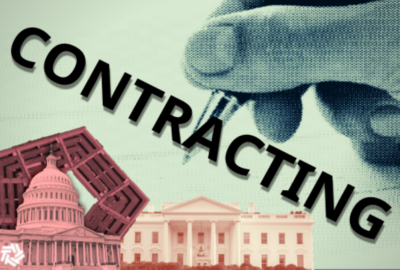Advice for contractors when the government really, really could shut down
Contracting will continue even with a long-term continuing resolution or even a partial government shutdown.
The brinkmanship in Congress isn’t looking good for 2024 budget prospects. Contracting will continue even with a long-term continuing resolution or even a partial government shutdown. For some advice on how contractors should deal with what might lie ahead, the Federal Drive with Tom Temin spoke with long-time federal sales and marketing consultant Larry Allen.
Interview Transcript:
Tom Temin We don’t know what’s going to happen in the next day or so before the first shutdown deadline, but contracting always continues in some manner, doesn’t it?
Larry Allen That’s right. I think the important thing to understand is, while all federal agencies are operating under a continuing resolution right now, the government is still open for business and things are still moving forward. While agencies can’t start new projects that require appropriated dollars, there’s plenty of stuff that’s happening right now in terms of planning. There are current projects that are ongoing and keep getting modified. And let’s not forget, there are other pockets of money like capital funds, aside from appropriated dollars that agencies can use sometimes for very specific purposes. But they can use them, and that’s getting done. So, the business of the people, while it’s not being done the best way possible, it is generally moving ahead.
Tom Temin And if you are supplying, say, critical ongoing services like security operations centers, even in a shutdown, you’re likely to continue that work.
Larry Allen I think that’s something that people have to keep in mind, particularly this week. Tom, and we are just a couple of legislative days away from the first set of, CRS expiring. They expire midnight March 1st. If you’re working on sensitive projects, things that are, essential operations or support essential operations, chances are you’re going to continue doing those things even in the event of a partial shutdown for the agency that you’re working for.
Tom Temin And I would say, two, as you enter an agency or deal with an agency, when someone is an essential employee and they’re on the job, or at least be sensitive to the fact that they’re not getting paid at the moment, they will get paid when the shutdown is over. Something to keep in mind in dealing with them.
Larry Allen That’s right. And I think that that’s, you know, even as we run up to what hopefully will not be a shutdown time, it’s a distraction for your federal coworker, for your federal customer, and they’re wondering about whether or not they’re going to get paid. They’re wondering about whether, you know, they’re going to be able to continue to provide for the needs for their themselves or their families, and that is inevitably a destruction. And a destruction can be a distraction, I guess, but it is certainly a distraction. From the day-to-day operations, you know, the good news for federal employees is that they will be paid eventually. But we’re not so sure about contractors. Contractors don’t always get paid for work that’s performed during a shutdown. It kind of depends on the nature of the work. But if you haven’t had those conversations with your federal customers now, you should be doing that immediately to plan for what could be, you know, a bumpy time.
Tom Temin We’re speaking with Larry Allen, president of Allen Federal Business Partners. Well, see, I guess maybe they want a future proof type of thing, and maybe they want a protest proof approach. And I wanted to ask you about a solicitation for comments coming from the General Services Administration for the follow-on contract EIS, which is not even fully adopted by all of the federal agencies mandated to use it. This is the big, government wide telecommunications deal. GSA is looking for what follows, and it feels a little bit early for that.
Larry Allen Tom, I think it is early. EIS still has about eight years to run on it. And, you know, that’s under the current, deadlines. You know, we have seen GSA more recently extend deadlines for their Oasis services, contract their Alliant2 IT contract, just to name two. So, it’s entirely possible that, you know, when we get to the end of EIS, we’ll see that extended out as well. So, we may be talking potentially about even more than eight years. Despite that, the agency went out last week and asked for comments from industry on what the state of network infrastructure is going to look like, for the next iteration of their contract. I was surprised about this for several reasons. One of what you pointed out, I think, it’s going to be a considerable amount of crystal ball gazing to figure out and speculate what the next generation of network infrastructure is going to look like in 8 to 10 years, you know. Think about where we were with telecommunications 8 to 10 years ago from today. There are things that we could have predicted, but there are things like the pandemic that. Profoundly changed the ways in which people worked. No one could have predicted. So, I thought that was interesting. I think in addition to, the timeliness of it, you know, we have to look and see what agencies are doing. And you kind of, you know, pinch into the lead in here. They’re not really running out to embrace the current EIS contract. I tend to look at the numbers. It took the first 6 or 7 years before EIS generated even $1 billion in annual sales. And while that’s a lot of money, if you stack rank that against contracts like the GSA schedule, like Oasis, like Alliant, that’s pretty small in comparison. And then you look even further, and you see, well, you know, the top three contractors are responsible for 90% of the EIS business. What that means is there are an awful lot of contractors, primes and subs that expended considerable resources to get on EIS. And they’re just not getting a return on that investment. So, I’ve got to wonder why industry would run right out and provide GSA for comments on a contract that’s going to be way over the horizon, may not be needed, and may not deliver the money and return on investment that they’re hoping for.
Tom Temin Plus, we’ll see who on the program is still working there in eight years when, you know, there’s been some well.
Larry Allen There is that. Yes.
Tom Temin All right. And then something else you’re writing about I wanted to ask you about, and that is plaintiffs’ attorneys trolling for whistle blower business. A little different view of what is often seen as the virtue of whistle blowers.
Larry Allen Tom, I took a page out of the Godfather movies for this one. The famous quote here is keep your friends close, but your enemies closer. It’s worth it for contractors to look at plaintiffs’ bar attorneys, for the actions they’re taking to try to attract whistleblowers for false Claims Act cases. You know, we write about compliance frequently because it’s an important topic, but we don’t really say, hey, you know, you need to look and see what people who might oppose you are doing. And they’re very, very active. And so, I was a little bit surprised, not just by the sheer numbers, because I’ve seen those before, but by the easy to use, step by step whistleblower guidance that many attorneys provide right on their website pages. For would be whistleblowers. I think it’s really important for companies to take a look at that to understand what, their disgruntled current or former employees or even competitors might be looking at to come against them with a whistleblower complaint. You’re better off understanding what could hit you before it does rather than get caught flat footed.
Tom Temin Yeah, there might be a new book in this whistleblowing for dummies.
Larry Allen Wouldn’t surprise me in the least. You know, as I was preparing this article, I saw data point 13 whistleblower cases are filed each week, and while the majority of those are for health care contracts for low health care contractors, they do affect every type of contractor. And even if many of them are without merit, you still have to expend time and resources to defend yourself.
Copyright © 2025 Federal News Network. All rights reserved. This website is not intended for users located within the European Economic Area.
Tom Temin is host of the Federal Drive and has been providing insight on federal technology and management issues for more than 30 years.
Follow @tteminWFED






